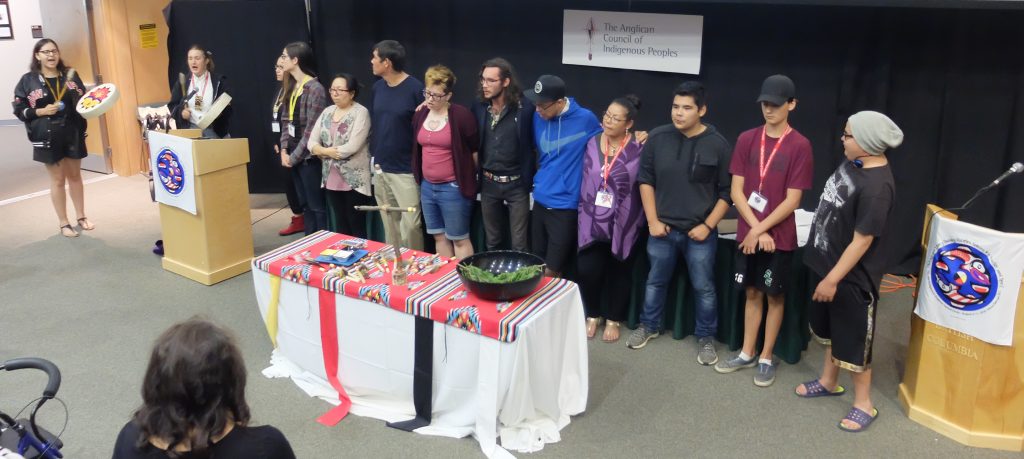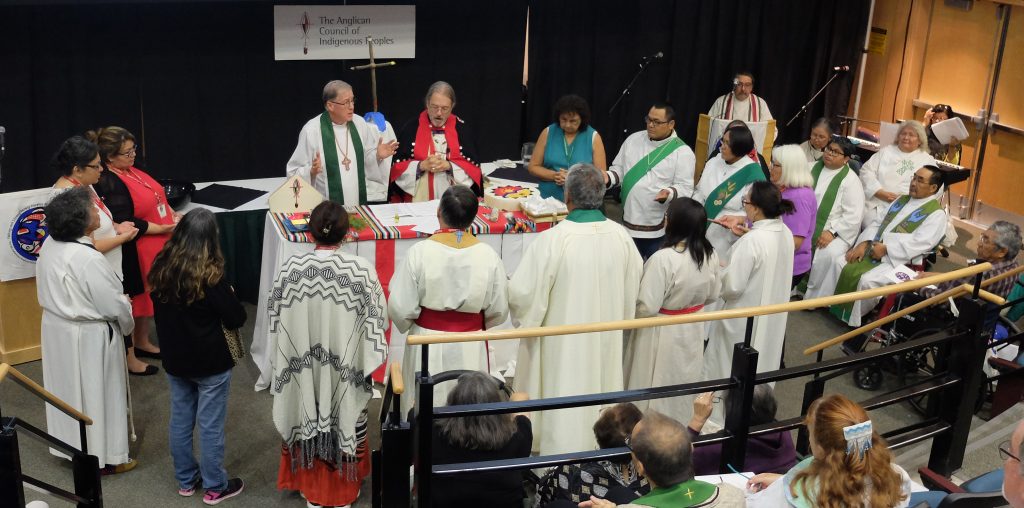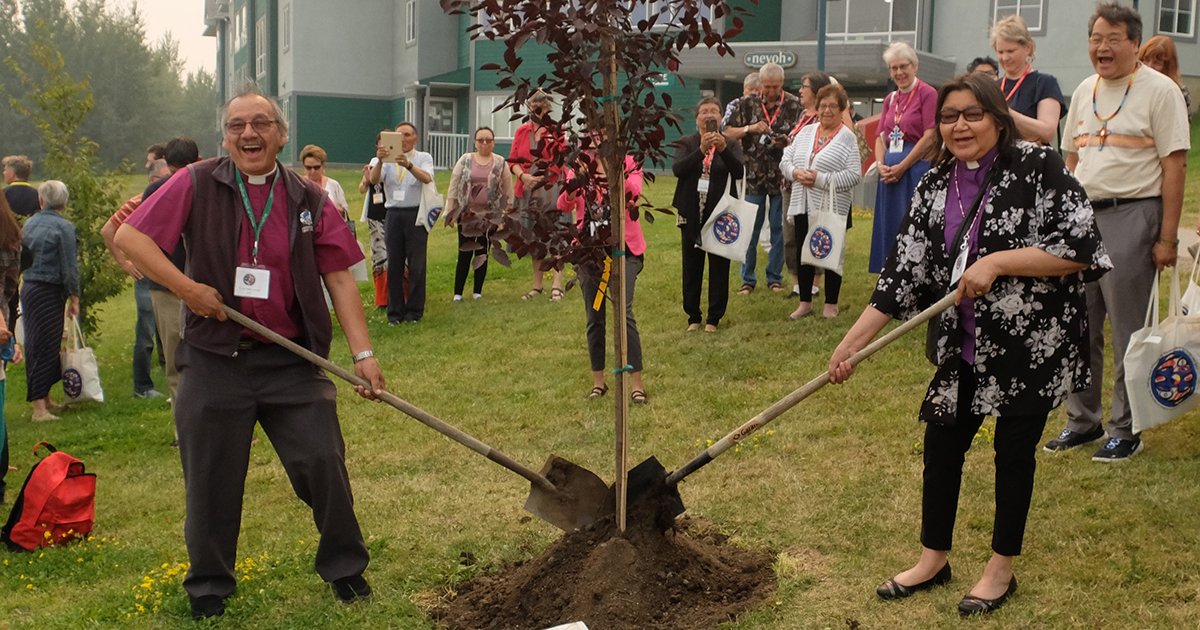On the morning of Friday, August 10, we pondered what it meant to be a disciple of Christ. By the end of the day we saw what it meant through the example of our fellow church members.
The Ninth Indigenous Anglican Sacred Circle opened with an opening Eucharist where Primate Fred Hiltz preached and looked back to the 25th anniversary of the acceptance of the apology by then-Primate Michael Peers. This Sacred Circle closed with a closing Eucharist and homily by the Primate that looked ahead to another milestone: the 25th anniversary of the 1994 covenant, which called for a new relationship between the Anglican Church of Canada and Indigenous people across the church based on self-determination.
When reflecting on how far the church had come in advancing the goals laid out in the covenant, Archbishop Hiltz was frank about the opportunities that are alive, the obstacles that remain and the challenges that still face Indigenous communities. But he also detailed a substantial record of discipleship that has laid the foundation for a truly Indigenous expression of the Church, and helping us all grow into the church that God is calling us to be.
‘Take up your cross and follow me’
The impact that gospel-based discipleship has in creating disciples had become clear to me by the time I attended my final talking circle on the last full day of Sacred Circle.
Each day, the practice of reading a gospel passage three times with others, and posing the same three questions of the text, had brought the Bible to life in a way I had rarely experienced before. It was in many ways the opposite of a standard homily, where one preacher stands at the front of the room and expounds on the day’s gospel reading. The exchange with others in a talking circle—a format more reflective of Indigenous cultures—helped us continually uncover new meanings in the text, apply it to our own life experiences, and leave the circle with a renewed sense of purpose and direction.
In Friday’s reading from Matthew 16:24-28, Jesus tells his disciples, “If any want to become my followers, let them deny themselves and take up their cross and follow me. For those who want to save their life will lose it, and those who lose their life for my sake will find it. For what will it profit them if they gain the whole world but forfeit their life?” We all had our own interpretations. But among the recurrent themes was the need to focus on our spiritual health and not on material things. There emerged a renewed emphasis on the importance of perseverance, self-sacrifice, and faith through all the difficulties we encounter in life.
Partner moments and focus group recommendations
Reminding us of the importance of friends and fellow travellers in our spiritual journeys, after gospel-based discipleship the members of Sacred Circle heard partner reflections from the Evangelical Lutheran Church in Canada (ELCIC) and the United Church of Canada.
National Bishop Susan Johnson brought greetings on behalf of the ELCIC, and assurance of their prayers. Attending her third Sacred Circle, the National Bishop said that the gathering for her had come to feel like a family reunion.
Johnson expressed the support of Lutherans as their Anglican full communion partners continues the journey towards a self-determining Indigenous expression of the Church. Moved by the practice of gospel-based discipleship, she noted that she would be taking it back to her church, not just as a tool for deepening their own discipleship, but as a reminder of the ELCIC’s ongoing partnership with the Anglican Church of Canada and the two churches’ shared commitment to Indigenous self-determination.
Ray Jones, hereditary chief of the Fireweed/Grouse clan in Gitsegukla, B.C., offered greetings from the United Church of Canada. He detailed the history of Indigenous ministry in his church; his experiences in residential school, where all students had “three companions: hunger, loneliness, and fear”; and his journey back to Christianity. Ray Aldred, director of the Indigenous Studies program at the Vancouver School of Theology, presented to Sacred Circle and described the vision for his program: “We train Indigenous people for the Indigenous church in Indigenous communities.”
After these reflections, representatives from the focus/working groups earlier in the week came to offer summaries of their discussions and recommendations for action.

A common thread connecting topics such as the opioid crisis, suicide prevention, and missing and murdered Indigenous women and girls was the continuing intergenerational trauma caused by the residential school system, which often manifested itself in poverty and addictions. Speakers urged the church to help communities by building relationships with families who are struggling and being a voice for them.
The focus group on the marriage canon wondered might happen to a self-determining Indigenous church in the event that proposed changes to the marriage canon allowing for same-sex marriage are passed at General Synod 2019.
In relation to how they might move together in the event of a decision that will be hurtful to some parties, the presenters recalled a “profound statement” from their discussions: “How can you ask us how we can walk together after our people have already suffered great wounds, and yet here we are?” The presenters also pointed to the need to translate the marriage canon into Indigenous languages to help people make decisions based on understanding rather than fear.
The focus group on governance for self-determination set a long-term goal of looking for Sacred Circle to have a voice and vote at General Synod, while expressing a desire to move away from the National Indigenous Anglican Bishop being a “program manager”. They planned to recommend to the Anglican Council of Indigenous Peoples (ACIP) that Sacred Circle sponsor a national gathering of praise, worship, and spiritual renewal.
Young people speak out
Youth and young adult members of Sacred Circle were the next presenters. Each spoke to issues of importance to them that they hoped Sacred Circle would take up as priorities, and ultimately the wider Anglican Church of Canada. These included:
- Learning more stories and traditional teachings from elders;
- Adding more interactive events and workshops at Sacred Circle and in parishes to impart skills such as drum making, crafts, learning songs, and making food;
- Creating safe LGBTQ2S+ spaces to make all youth feel welcome;
- Continuing to open spaces in the church to encourage community engagement with all, but especially to draw in youth;
- Meeting more with elders to learn from them and share respective experiences together, perhaps by having a rotating guest elder to speak and meet with youth;
- Supporting those in prisons through an increased commitment to prison ministry and greater funding for chaplaincy, which has been heavily privatized in recent years; and
- Hosting a youth gathering to focus on issues such as poverty, abuse, and healing, and to learn more about youth from all corners of Turtle Island.
Taking up their drums, presenters Danielle Black and the Rev. Leigh Kern led the other young members and Sacred Circle in singing “The Strong Woman Song” and the “Ancestors Song”, which they dedicated to Indigenous people who attended residential schools and those who have died in prisons.
Sowing seeds and watering those already planted
The hymn that started the closing Eucharist, “Holy! Holy! Holy!”, included verses sung in six languages: English, Naskapi, Plains Cree, Oji-Cree, Inuktitut, and Moose Cree. Both the first and last verses were sung in English.
As a non-Indigenous person whose first language is English, I was used to the luxury of being able to sing, read, and pray in my own language. With the lyrics in Indigenous languages spelled out phonetically on the page, I attempted to sing along, but to my frustration found it difficult to pronounce the words. Did others share the same feeling? Our collective singing in the room became noticeably quieter, shakier, less confident when the verses were sung in Indigenous languages, before swelling again in volume during the last verse in English. In that moment, it seemed as if our hopes and actions could not always match the height of our ambitions, but clarified our deep yearning for a brighter future.
Fittingly, the Primate’s homily seemed to reflect these concerns. Archbishop Hiltz honoured the “holy men and holy women”, the “faithful disciples of our Lord Jesus Christ” who had signed the 1994 covenant—many of whom were still with us in that room in Prince George. He described the tears that had been shed on that momentous day: “Tears for the sad state of affairs of the people whom these leaders represented. Tears for the overwhelming poverty and despair in their communities. But tears, too, for the wonder and grace and power of God in that moment.” He evoked the spirit of hope and encouragement that swept through Indigenous Anglicans as they called their people into unity and a self-determining community within the Anglican Church of Canada.
Twenty years after signing the covenant, Indigenous leaders gathered again to discuss what had changed since then. They noted with sadness, the Primate said, that “the overwhelming poverty and despair that had prompted the covenant in first place had not lifted. In fact, it was feeling heavier.” Yet as more tears were shed, they continued to plant the seeds for what has been called a “church of living hope”.

Last year, Indigenous and non-Indigenous Anglicans gathered for the Road to Warm Springs in Pinawa, Manitoba. At that gathering, the Primate recalled, he and the National Indigenous Anglican Bishop had learned a great deal about “the spirit of partnership that the 1994 covenant continues to call us” to.
In relating the events of the past four days as Sacred Circle drew to a close, the Primate described that spirit of partnership infusing all the members and guests of Sacred Circle as they continued to walk together on the journey towards self-determination. He quoted the words of a prayer often attributed to the slain archbishop Oscar Romero:
We plant the seeds that one day will grow.
We water seeds already planted, knowing that they hold future promise.
We lay foundations that will need further development.
These words, Archbishop Hiltz said, captured what had been accomplished at the current Sacred Circle. “We are but labourers, watering seeds planted by others … looking together for growth that God alone can give, looking together for that day of reaping with its songs of joy.”
The Primate saw sowers in Indigenous Ministries Coordinator Ginny Doctor and National Indigenous Anglican Bishop Mark MacDonald, who believed the best days of Indigenous ministries in the church were ahead of us. He saw them in ACIP; in the work of the Indigenous House of Bishops Leadership Circle; in the diocesan bishops; in the men and women who facilitate community programs, language revitalization, and suicide prevention. He saw it in the offices of the General Synod; in the work of the Anglican Healing Fund, the Primate’s World Relief and Development Fund, and the Anglican Foundation. And he saw it in the rising generation of young people who had laid out plans for a future with hope.
Postscript
Later that evening, after the Eucharist had ended, members of Sacred Circle honoured individuals including Healing Fund Coordinator Esther Wesley; General Synod Archivist Nancy Hurn; Lisa Barry, Becky Boucher, and Scott Brown of Anglican Video; and Program Associate Teresa Mandricks, Secretariat of the National Indigenous Anglican Bishop.
The biggest tribute, however, came to Archbishop and Primate Fred Hiltz, who will be resigning as Primate at the end of next year’s meeting of General Synod in Vancouver. A special video included wishes of farewell from Sacred Circle members, many speaking in their traditional languages, while gifts were also bestowed upon the Primate.
Though Archbishop Hiltz was not the only staff member at Sacred Circle who faced impending retirement, he was emblematic of the crossroads that the church finds itself in as it prepares to pass the torch to new generations of leaders. Yet for all the bittersweet emotions in seeing the departure of beloved leaders of the church, the occasion was marked equally by that very hope for the future that the Primate had described in his homily.
The next morning, the Sacred Fire was extinguished. The members of Sacred Circle departed for home. But the fire in our hearts would continue to burn, as we sought to share with others the same warmth and light it had brought us during our time together in Prince George, B.C.
Interested in keeping up-to-date on news, opinion, events and resources from the Anglican Church of Canada? Sign up for our email alerts .

